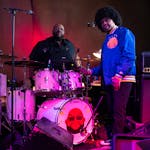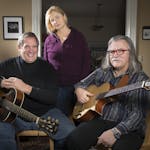Perpetually inquisitive by nature, guitarist Mary Halvorson went to Wesleyan University to become a biologist. Then she sat in on a music class taught by Anthony Braxton, a titanic figure in the avant-garde jazz realm.
"I really fell in love with music," she recalled by phone from her New York City home. "He helped me discover how large the musical world is, that you don't have to follow a particular path. [Braxton] really emphasized finding my own thing, so I valued it more. I'm pretty sure I wouldn't be a musician without him."
Last year, at age 38, Halvorson was awarded a MacArthur Foundation "genius grant," winning praise for "an aesthetic that evolves and surprises with each new album and configuration of bandmates." On Saturday, she'll bring two of those bands to Walker Art Center: the collective trio Thumbscrew and the adventurous sextet Code Girl — its name inspired by a Braxton remark.
Regardless of the context, Halvorson's music is marked by a dynamic breadth of moods, tones and textures.
As a young girl, she quit violin lessons to take up electric guitar because she was intoxicated by the shredding, feedback and balladry of Jimi Hendrix.
"Tranquil melodies melt like Dali's clocks," wrote one reviewer of her 2015 solo album "Meltframe." In her last visit to the Twin Cities, a 2016 solo appearance in the Walker's Burnet Gallery, her fretwork easily careened from delicate to gnarly and back again.
NPR has described Halvorson as "a personality drawn at once to unruly possibility and fastidious detail," a paradox borne out by the at-times painstaking evolution of the bands that play her distinctly unpredictable music.
After releasing a record with bass and drums as the Mary Halvorson Trio in 2008, she added trumpet and alto saxophone to make the Mary Halvorson Quintet in 2010, then tenor sax and trombone for the Mary Halvorson Septet in 2013, and finally pedal steel for an octet album in 2016.
Code Girl — the project she says she is "most excited about now" — has undergone a similar metamorphosis since the release of its double-CD debut two years ago.
It was the first band for which she composed lyrics as well as music.
"Writing lyrics and having never worked with a vocalist in a band before, I wanted a strong foundation with people I really trust, and immediately thought of the Thumbscrew rhythm section," she said, speaking of drummer Tomas Fujiwara and bassist Michael Formanek.
For Code Girl's second record, due later this year, Halvorson switched trumpeters (from Ambrose Akinmusire to Adam O'Farrill) and added a saxophonist and second vocalist, Maria Grand.
"On about half the songs, Maria is playing saxophone, so I have the instrumentation of sax, trumpet, voice [original vocalist Amirtha Kidambi], guitar, bass and drums," Halvorson explained. "And on the other half she is singing harmonies — there is one song where she is the only singer — so I just have one horn, the trumpet, and two voices. I like that flexibility, of having different colors present in the songs."
That's not the only change. The producer of Code Girl's records, David Breskin, is also a published poet. He challenged Halvorson to organize her lyrics into different poetic forms, including a sestina, a ghazal, a pantoum, a tanka and a haibun (which combines haiku with prose).
She thought it was "a really cool idea. A lot of those forms are very musical anyway, with rhyme schemes and repetition. It presents you with different structure which you can then make your music around. And then the last group of lyrics I wrote were more free-form without structure."
At the Walker, Code Girl will only play new material. "Right now I'm more interested in the new songs and arrangements for this expanded version of the band," Halvorson said. The lyrics remain purposefully cryptic, though. "I'm not interested in laying things out explicitly. I'd rather the listener or reader come away with their own interpretation."
While she takes an overt leadership role in Code Girl, she considers herself an equal member in the trio Thumbscrew, which will open Saturday's show. "Maybe it's because people don't think drummers and bass players can be leaders or something, but over and over people talk about Thumbscrew as being my band, which is pretty frustrating for all of us," she said.
That might sound like someone protesting too much, but drummer Fujiwara testifies to her generosity of spirit.
"When you tour with someone, with all the late nights and early morning and schlepping around, their real personalities come out. And I realized very early on just how fun it is to tour with Mary. She's positive and energetic and has a great sense of humor but she's also professional, very organized, helpful and caring of other people.
"I think that balance allows her to operate in a lot of contexts both musically and personally that really connect with people."
Having already been ratified as a "genius," how does Halvorson feel about turning 40 next October?
"Oh, I'm excited about it," she enthused. "Some people get bummed out by birthdays, or whatever, but I like having these kinds of markers. So I think I am embracing it."
Britt Robson is a Minneapolis journalist and critic.






